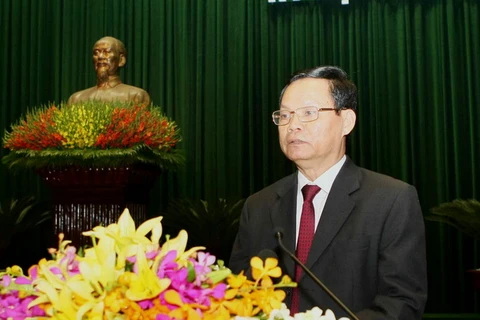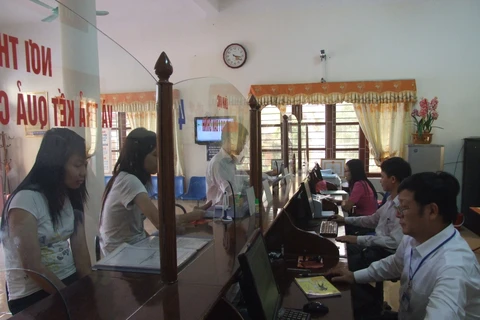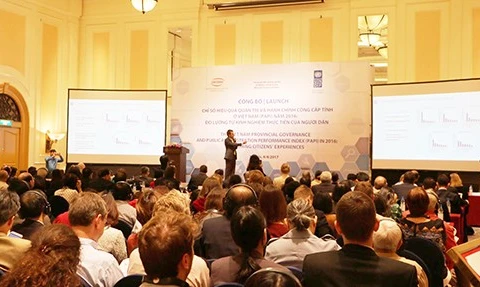Hanoi (VNA) – Findings from the 2017 Provincial Governance and Public Administration Performance Index (PAPI) Report, which was released in Hanoi on April 4, showed a significant turnaround in citizens’ perceptions and experiences in corruption in the public sector.
A total of 14,097 citizens randomly selected from all 63 provinces and cities were interviewed for the 2017 PAPI, which assesses citizen experiences with national and local government performance in governance, public administration and public service delivery.
Speaking at the launch ceremony, Kamal Malhotra, UN Resident Coordinator and UNDP Resident Representative in Vietnam, said: “The 2017 survey results are mixed and reveal both encouraging and worrying trends. Particularly noteworthy is the reversal in the downward trend since 2013 in control of corruption in the public sector.”
“Citizens report improvements in both their perceptions and personal experiences. However, the PAPI scores are still below the levels found in 2012, so although the direction of change is positive, much work remains to be done to fight corruption - to ensure that the findings of the 2017 PAPI report do not represent a temporary aberration but signal the start of a systemic and fundamental reversal of what has been a worrying longer-term trend on corruption,” he said.
Australian Ambassador to Vietnam Craig Chittick commended PAPI as a data gold mine for Vietnamese policy makers and researchers seeking to implement policy reform and improve government performance.
The ambassador said that Australia will be the main sponsor of PAPI for the next three years, providing a total of 2.9 million USD. “This support falls under the umbrella of the Aus4Reform program, which is supporting the Government of Viet Nam to deliver higher, more inclusive, and better quality economic growth,” he said.
Of the six governance areas measured in 2017, the greatest gain was seen in control of corruption in the public sector. Citizens reported improvements in both their perceptions and personal experiences: only 17 percent said they directly experienced bribery when applying for land use rights certificates, down from 23 percent in 2016, and the proportion experiencing bribery when using public district hospital services fell to 9 percent in 2017 from 17 percent in 2016.
Citizens reported several positive trends related to political participation at the local level in 2017. The largest increase was in the proportion of citizens reporting that local projects were monitored by Community Investment Supervision Boards: the rate surged from 21 percent in 2016 to 34 percent in 2017. A higher proportion of citizens also reported having a second candidate to choose from in village head elections – up from 42 percent in 2016 to 49 percent in 2017.
Citizens reported that overall provincial performance in vertical accountability improved slightly. In 2017, about 25 percent of respondents across the country said they met village heads to discuss a problem, an increase of about 3 percent from 2016. For those who met with village heads, about 83 percent rated the meeting as successful, down from 85 percent in 2016.
Results also show good progress made by all provinces in public administrative procedures. Overall, citizens said they were more satisfied with procedures at local one-stop shops in three out of the four services that PAPI measures (certification, construction permits, and personal documents), and they reported a significant increase in accessing one-stop windows for land use rights certificates (up from 79 percent in 2016 to 86 percent in 2017).
Finally, the 2017 PAPI Report looks at overall provincial performance. Scores for all of the country’s 63 provinces and cities increased in 2017 compared to 2016, and seven saw significant improvements.
PAPI is a policy monitoring tool that assesses citizen experiences and satisfaction with government performance at the national and sub-national levels in governance, public administration and public service delivery. Since its pilot in 2009, PAPI has directly interviewed 103,059 Vietnamese citizens nationwide. PAPI measures six dimensions: participation at local levels, transparency, vertical accountability, control of corruption, public administrative procedures and public service delivery. The survey has been implemented nationwide each year since 2011.
PAPI is a collaboration between the Centre for Community Support and Development Studies (CECODES), the Centre for Research and Training of the Viet Nam Fatherland Front (VFF-CRT), the Real-Time Analytics and the United Nations Development Programme (UNDP).-VNA
VNA

























